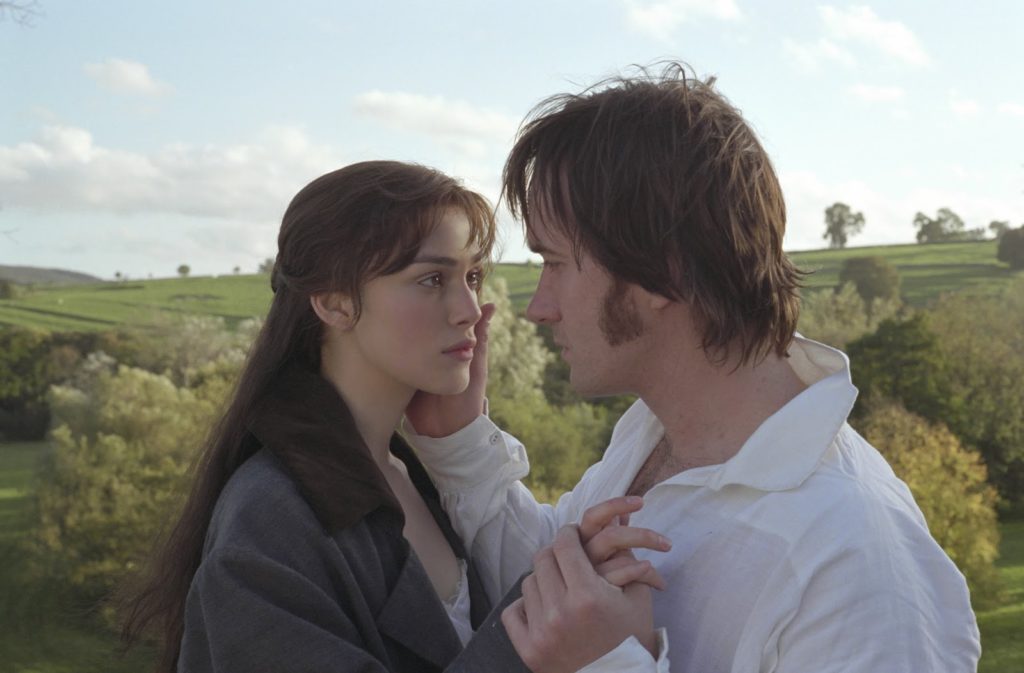
In 18th century England, the Bennet household bustles with five nearly grown daughters, one bemused father and a giddy mother with a singular goal—to arrange for her daughters “advantageous” marriages to wealthy men. The motivation is practical. With no sons to pass it on to, the relatively cash-poor Bennets will likely lose their family estate. Their only hope is for one of the daughters to find a husband willing to support all of them.
Fortune smiles when the young and prosperous Mr. Bingley rents a mansion in their area. A community ball initiates attraction between Bingley and the eldest Bennet girl, animosity between his friend, Mr. Darcy, and Elizabeth (“Lizzie”) Bennet, and an awareness among the principals of the social differences separating them. Specifically, Lizzie is conscious both of the wanton public foolishness of her mother and younger sisters and the resulting disapproval of Mr. Bingley’s sister and Mr. Darcy.
Of course, this is Lizzie’s love story. Her initial “loathing” toward the seemingly aloof and arrogant Mr. Darcy is only deepened the more she learns about him, especially from a young army officer named Mr. Wickham. But she can’t quite escape her unexplainable feelings for Darcy, and she can’t understand why he continues to express interest in her.
These characters exist in a world so chaste and proper that it’s almost shocking to our modern sensibilities. Marriages are pursued and love is expressed with virtually no physical contact beyond public dancing in groups at community and private balls. Female honor and reputation are valued and defended at great cost.
Parents, even foolish ones, are treated with respect and compassion. Of course, some of this properness is created by the fear of being discredited in a community driven by status and a strict class structure. But the commitment to a veneer of respectability alone is revealed here as damaging. So, in general, the attitude of respect and decency is refreshing.
Lizzie defends the honor of her parents and sisters when others mock their common ways. Mr. Bennet obviously loves his wife and girls, and he expresses strong support and concern for Lizzie. Lizzie and Mr. Darcy both admit to coming to wrong conclusions about the other. Mr. Darcy sacrifices both his pride and his prejudice to help Lizzie’s family and earn her respect and love.
Mr. Collins, a cousin to the Bennet girls, is a minister. As Lizzie plainly states, he’s a ridiculous man. He exists in the story, in part, to provide comic relief, forcing on the Bennets both unwanted sermons and unrequited affection in pursuit of a wife.
We’re “treated” to an excerpt of one of Collins’ tedious messages, including an unintended and comical misuse of the word intercourse. Period costumes reveal some cleavage, and nudity is on display in collected paintings and sculptures. Chaste kisses are exchanged both before and after a wedding.
None.
One character exclaims, “Good lord!” Another calls himself an “a–“ for his foolish behavior.
Drinking is prevalent at the two balls attended by the family, resulting in even less socially proper comments and behavior from Mrs. Bennet and the younger daughters.
Fans of Jane Austen’s classic novel—as well as the millions who cherish the six-hour 1995 BBC miniseries starring Colin Firth and Jennifer Ehle—may well wonder at the point of yet another telling of this tale. But first-time feature director Joe Wright tells it so well that few Austen lovers will be complaining after taking it in.
Lost to the two-hour running time are some of the complexities of the plot, as well as some of the great, pointed, clever exchanges of dialogue Austen is known for. Enough remains to remind us of her ability to use words as weapons and gifts in quick and equal measure. But the tight focus of Wright’s film is the unabashedly romantic love story between Lizzie and Darcy, and his story satisfyingly ebbs and flows with their affections.
The mixed British and American cast skews younger than in previous adaptations, and the whole ensemble delivers. Keira Knightley is believably sharp-witted, and Matthew MacFadyen’s stiff Darcy gradually disarms as his character is revealed. But old pros Donald Sutherland and Brenda Blethyn shine brightest as the wise and foolish Mr. and Mrs. Bennet. It’s telling that the film’s most moving moment comes with Mr. Bennet’s reaction to Lizzie’s announcement about her true feelings for Mr. Darcy.
Wright doesn’t just capture the precision of good acting or the beauty of the English countryside, though. In addition to offering a well-crafted film that families (especially those with tweens and teens of the female persuasion) can enjoy together, he serves up Austen’s story in a way that makes it a great starting place for conversations about issues of growing up, finding a mate, history, culture and family relationships. Better, it might lure new readers to Austen’s books and other literature of the period. Not bad for the umpteenth adaptation of a nearly 200-year-old work.
